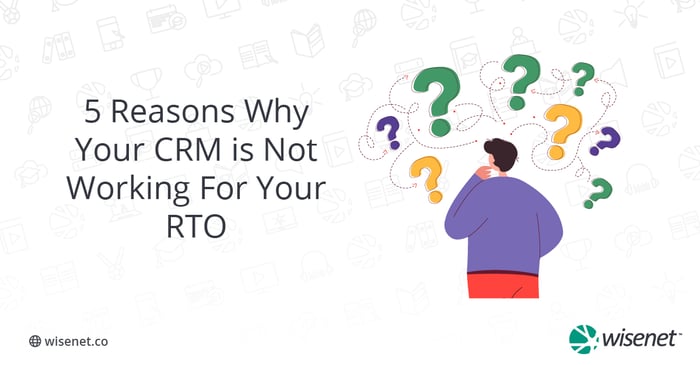
You’ve shopped around for CRM platforms for your college and you're at the final stage of deciding if a generic CRM or education-specific CRM is the right fit. Everything has its pros and cons, so when making such a major decision, it's important to weigh these up to make an informed and confident decision. In this blog, we’ve done the heavy lifting for you, weighing up the positives and negatives of the contrasting CRMs which will give you a clearer picture to make your CRM shopping journey easier.
What is a Generic CRM?
As its name suggests, generic CRM software is not built for a particular market. It’s an off-the-shelf product that is ready to be used as soon as you’ve purchased it. Features are non-specific, and made for a mass audience, meaning they aren’t specifically designed for a specific industry and don’t take specific industry requirements into account. Businesses are given a plate of features of which most will only use a few, but you still have to pay for the full CRM even if you only use 50% of its features.
What is an Education CRM?
An education CRM, unlike generic CRMs, is fit for purpose. Education CRMs provide the education industry with specific features required to move your processes forward. The system is less cluttered than generic CRMs, meaning your processes don’t have to work around the features, since the system is made with your college needs in mind. All features are specifically and carefully built taking the education industry into account, meaning you will make use of most, if not all.
Here are 5 reasons why your current CRM may not be working in favour of your RTO:
1. Pre-built software features your RTO doesn’t need
A generic CRM is often bulky because it's designed for a general audience with features that cater to all industries. As a college, you might find that you only use 25-50% of these features with most features remaining untouched since they don’t pertain to your industry. A generic CRM can frustrate users who navigate through the clutter to achieve a desired goal.
Some examples of these unneeded features include:
- Generic terminology
- Lack of payment gateway options
- Timetable visibility
- Course publishing options
On the contrary, bespoke education CRMs are built taking the education industry's needs into account. They are built knowing how unique your college is, catering to your needs by developing specific features to acquire, retain, and engage students. This in turn makes the navigation process easier and minimises the frustration of sieving through unnecessary features that don’t pertain to your industry.
2. Inadequate scale with your RTO needs
All industries have varying industry standards that change over time. Gradually your college requirements will change. To make things easier for users and your RTO, the CRM you choose should grow and update as this happens.
Education CRMs are scalable and understand the industry's needs. The education industry is constantly changing with new innovative ways to acquire and retain students. Since education CRMs are built with this in mind, they too update and upgrade with industry changes. Colleges can expect seamless operations and processes with a CRM that understands their needs, without the hassle or worry of making a plan to accommodate these changes.
On the flip side, generic CRMs are restrictive when it comes to changing requirements. They are designed for a larger audience targeting all industries, without a particular focus and don’t update to accommodate a specific industry's needs. Sure they have updates as they should, but these are broader and less targeted to your needs. Users are forced to work outside of the system to achieve the desired goal of keeping abreast with changes through the use of Word documents and Excel spreadsheets, for example, pushing them back to where they started.
3. Avoid additional hidden costs
Generic CRMs appear cheap at first, but as your college requirements change you might require additional functionality that the generic CRM does not cater to. Since generic CRMs are restrictive, the upfront eye-catching price will slowly but surely turn into a spiralling accumulation of expenses as you turn to add-ons and other systems that cater to the changes that your system does not accommodate. This often leaves colleges in a pickle as costs add up, leaving you in an undesirable situation. Changing systems after investing in a system you thought would be cost-effective is a process so make sure you invest in the right one from the start.
Education CRMs adapt and update with industry changes and needs. Functionality and features update as new changes are implemented, preventing you from scrambling to look for solutions like Excel spreadsheets, plug-ins and add-ons. This is more comforting for colleges as costs don’t fluctuate, allowing you to budget correctly.
4. One size does not fit all
Generic CRMs often market their software as a one-size-fits-all solution, meaning that the CRM can cater to all businesses and fit in all instances. But the one-size-fits-all market is not all as it appears to be. All industries vary, from what they offer, and stand for, to how they operate on a daily basis. While generic CRMs may have certain features that your college will benefit from, others won’t pertain to you at all and might be better suited for the manufacturing industry, for example. This once again leaves you with a cluttered CRM designed with no specific need in mind, let alone your college's needs.
An Education CRM on the other hand is designed with the education industry in mind leaving you with a pot full of ingredients that you’re sure to love. All features will be used since they are designed just for colleges, and users will feel secure knowing that the features will update as the industry progresses, leaving less room for frustration and concern.
5. Your RTO is lacking the competitive edge
It’s highly likely that most of your competitors are using generic CRMs. The chances are that they are working with the same templates as you and have similar marketing strategies to increase applications at their college. In an ever-increasing competitive college landscape, it is vital to keep ahead of the competition to allow your college to stand out from the crowd. Generic CRMs provide standard features that could be detrimental to keeping your college valid and desirable. To keep your college one step ahead, you might want to consider using an industry-specific, education CRM. Enhancing differentiation between your college and your competitors is key to strengthening your college and attaining that competitive edge you need to increase enrolments.
Sales+ CRM revolutionises student recruitment in just 3 steps. Let us show you how Sales+ can meet all your needs and more.



COMMENTS